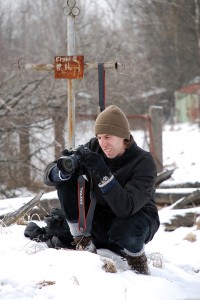
Michael Forster Rothbart, 2008-2009, Ukraine, taking photos in the Semikhody graveyard less than a mile from the Chernobyl Nuclear Power Plant
The following blog post is by alumnus Michael Forster Rothbart, who coordinated the compilation and assembly of the current Fulbright Alumni Photography Exhibit, now showing in The Atrium Gallery at the Ronald Reagan Building, 1300 Pennsylvania Avenue, NW, Washington, DC, through November 10, 2014. Opening reception and gala to be held at the gallery on Friday, October 17 at 5:30 p.m. Visit the gallery’s Facebook page to learn more.
One month into my Fulbright U.S. Student Program grant to Ukraine, I moved to Sukachi, a village of 1,200, ten miles from the Chernobyl Exclusion Zone.
What’s it like to live near Chernobyl? It depends who you ask. “Is it even safe?” they asked in Kyiv. “Why would you want to live up there, in the middle of nowhere?!” But when people in Sukachi asked where I lived, I said I rented a room from Nina. “Oh, how convenient,” they’d say. “That’s right in the middle of the village!”
I made friends. I drank vodka with my landlord Nina. I drank tea with Viktor. I photographed my neighbors. Sasha, a recovering alcoholic, taught me how to cut hay. Slava, a doctor at the Chernobyl plant, taught me to make borscht. I went to church. I lived my life like the locals as much as I possibly could.
My commitment to this project began when I discovered how most photojournalists distort Chernobyl. They visit briefly, expecting danger and despair, and come away with photos of deformed children and abandoned buildings. This sensationalist approach obscures the more complex stories about how displaced communities adapt and survive.
In contrast, I sought to create full portraits of these communities. I saw suffering, but also joy and beauty, endurance and hope. Living directly in the villages where I photographed gave me access to events and people with an insider’s perspective.
The Fulbright Program gave me freedom; away from newspaper deadlines, I found myself photographing more artistically.
I am interested in questions about home: how do people cope when their homeland changes irreversibly? Why do so many stay? These questions are the theme of my book on Chernobyl and Fukushima—a direct outgrowth of my Fulbright experience—published by TED Books last year.
For many, losing their original homes was as traumatic as the accident itself. I heard compelling stories about alcoholism, mental illness, unemployment, medical care, cancer, birth defects and corruption. Some overcome these difficulties; others surrender to them.
I’ll be honest: it wasn’t easy. I don’t miss trips to the outhouse on winter nights, or trips to the nearest city to check my email. Worse than such discomforts was a sense that I had important work to do but felt unsure where to focus my attention. Everyone I met had significant stories to share.
Eventually I realized that my work is not authoritative: witnessing is a deeply personal act. My goal became, simply, to listen carefully and observe deeply, and to record these experiences. Like many Fulbrighters, I think, my witnessing is not about change but reflection: I’m holding up a mirror. Now when I have Chernobyl exhibits, I seek to engage communities in frank discussions about their own local issues. At my forum near the beleaguered Vermont Yankee plant, I watched as nuclear plant workers and anti-nuke activists truly heard each other for the first time. It was inspiring: this is a way I can give back.
Many Fulbright alumni say their experiences changed them. It’s true for me. I grew as a photographer, becoming surer of how I want to work. I grew professionally—opportunities like university and museum exhibits, and speaking at the UN and on CNN—all happened because of my Fulbright. Most importantly, I grew personally. I became more compassionate. The families who I documented welcomed me into their homes and trusted me with their stories. Over time, they became not just my subjects but also my friends.
Michael Forster Rothbart’s book Would You Stay? is available on Amazon.com and iTunes. There is also an excerpt and an interview on theTED blog. His Fulbright project website is After Chernobyl: www.afterchernobyl.com.

No Comments